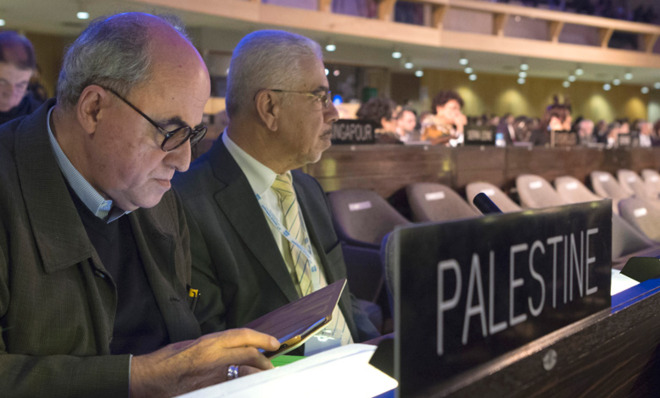Why UNESCO's suspension of U.S. and Israeli voting rights is a dumb move
The decision will only exacerbate Israeli-Palestinian tensions

A free daily email with the biggest news stories of the day – and the best features from TheWeek.com
You are now subscribed
Your newsletter sign-up was successful
Today, the United Nations Educational, Scientific, and Cultural Organization (UNESCO) announced that it was suspending the voting rights of the United States and Israel. The decision resulted from the fact that the two countries have refused to pay their dues, as a protest against the international organization granting full voting rights to Palestine.
Although a clear chain of events led up to UNESCO's decision, the move is unfortunately unlikely to accomplish much of anything, other than to further strain Palestinian-Israeli relations.
In 2011, UNESCO approved full membership to Palestine, triggering two U.S. laws passed in the 1990s, including one that states the U.S. will not donate to "any affiliated organization of the United Nations which grants full membership as a state to any organization or group that does not have internationally recognized attributes or statehood."
The Week
Escape your echo chamber. Get the facts behind the news, plus analysis from multiple perspectives.

Sign up for The Week's Free Newsletters
From our morning news briefing to a weekly Good News Newsletter, get the best of The Week delivered directly to your inbox.
From our morning news briefing to a weekly Good News Newsletter, get the best of The Week delivered directly to your inbox.
Since the U.N. group charges higher dues to wealthier countries, losing U.S. funding left a major dent in its finances. To date, the U.S. owes $240 million in dues, or about 22 percent of UNESCO's budget, forcing the committee best known for its World Heritage sites to cut programs and decrease funding.
Yet, if UNESCO wanted to improve cooperation with the U.S. and Israel, or even just increase its funding, removing voting rights wasn't the best tactic. As John Hudson at Foreign Policy puts it, "The U.N. is charging America hundreds of millions for membership in a club it can't vote in." Also, erring on the side of intimidation isn't the best approach for dealing with your formerly biggest funder, especially when its president has been trying to rectify the issue.
President Obama and then-Secretary of State Hillary Clinton supported a waiver that would have allowed U.S. funding to UNESCO. "All of the right people have said the right things," Peter Yeo of the Better World Campaign told Foreign Policy.
Nevertheless, since UNESCO funding is not high on Congress' list of priorities (the legislature was busy with the shutdown and the usual perpetual gridlock), UNESCO decided to suspend voting rights. But if UNESCO thought that would catch Congress' attention, it may be in for a very long wait. The hard truth is that "the biggest obstacle may be finding the oxygen to even discuss the issue given all the other topics that will occupy Congress' time this winter," said Hudson.
A free daily email with the biggest news stories of the day – and the best features from TheWeek.com
Another problem is that the U.S. hasn't had a tremendous amount of success or influence in UNESCO, even when it was a voting member. For example, even though the U.S. strongly objected to it, UNESCO inexplicably elected Syria to its human rights committee. Also against U.S. efforts, UNESCO's executive board passed six resolutions condemning Israel this year alone. "These actions cast doubt on U.S. influence in UNESCO," writes Brett Schaefer at National Review.
Furthermore, Schaeffer explains, the U.S. still directly funds many of the same programs that would have received their money via the U.S.'s dues to UNESCO, such as Holocaust education programs and tsunami-related efforts. "The bottom line is that America's interest in supporting UNESCO is not critical," concludes Schaefer.
However, while it may not be critical, UNESCO's move could not have come at a worse time, isolating the U.S. and Israel on a global platform just as Secretary of State John Kerry is trying to facilitate talks for a two-state solution. Anything that contributes to tensions between Israelis and Palestinians is only going to prolong a successful resolution.
There can be no winners at this juncture. UNESCO just made a bad situation a little worse.
Emily Shire is chief researcher for The Week magazine. She has written about pop culture, religion, and women and gender issues at publications including Slate, The Forward, and Jewcy.